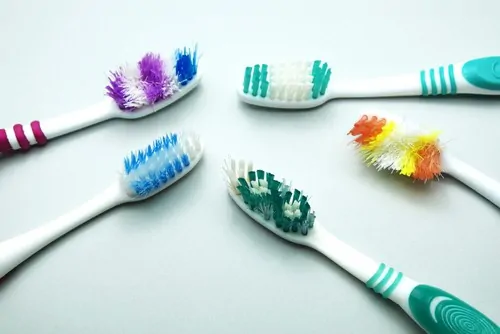Blog
“Why Do I Keep Biting My Tongue At Night?”
Everyone enjoys getting a solid night’s sleep. It not only feels great… it also provides some valuable health benefits, too. But sometime, sleep can be interrupted by any number of things — a snoring partner, a sick child, or even from biting your own tongue. If this last item happens to you frequently, my dental office in Douglasville encourages you to find out why. We’re here to help.
Common Causes
Nighttime tongue biting is actually pretty common, but it can be incredibly uncomfortable and painful. What’s more, it may be a sign that something more serious is going on. The top reasons someone may experience tongue biting during sleep include:
- Nighttime seizures
- Grinding your teeth
- Rhythmic movement disorder
Let’s take a closer look at each cause and potential treatment.
Nighttime Seizures
Seizures are usually categorized by a tightening of muscles accompanied by violent twitching. Involuntarily biting of the tongue is also one of the main indicators of seizures. But the symptoms aren’t always so noticeable, and sometimes there are no daytime signs and rather only occur during sleep. Treatment: Using a seizure medication can help prevent seizures and, in turn, tongue biting.
Rhythmic Movement Disorder
This disorder causes individuals to experience jerks or sudden movements during sleep, usually in the head or neck. Typically more common in children, sometimes rhythmic movement disorder can appear as head banging and may result in injuries to the eyes, brain, and yes, tongue. Treatment: The good news is rhythmic movement disorder in children tends to go away on its own. If not, medication may be recommended.
Grinding Your Teeth
Nighttime bruxism, also known as grinding your teeth, is fairly common but can cause someone to bite their tongue unwillingly. Teeth grinding may also create additional dental problems like chips and cracks. Treatment: A bruxism night guard can protect teeth from grinding against each other, as well as the tongue from being bitten
If you suffer from frequent nighttime tongue biting, talk with your dentist in Douglasville to determine if grinding your teeth may the cause and to discuss the best treatment for your specific needs. My Douglasville dental office also encourages you to see your physician if another culprit is suspected.
Accepting patients from Douglasville, Lithia Springs, Villa Rica.
Top 4 Causes of Dry Mouth
Dry mouth is an uncomfortable feeling that all of us experience occasionally. But living with a chronically dry mouth isn’t just uncomfortable, it’s unhealthy too. At my Douglasville dental office, we wanted to examine the top causes of dry mouth, why it’s so concerning, and ways to combat it for healthy, happy mouth.
Why Is Dry Mouth Concerning?
When the mouth is dry, it means your body isn’t producing enough saliva to keep it moist. Saliva is crucial for oral health has many jobs. It helps wash away food particles, neutralizes acids, and even kills bacteria. Without it, you’re at increased risk for things like tooth decay and infections in the mouth.
Top Causes of Dry Mouth
- Medications. Many medications can contribute to dry mouth, hundreds in fact. Most commonly, these medicines are those used to treat depression, anxiety, pain, and cancer. Look at the label on your medications to see if dry mouth may be a side effect.
- Diseases & Medical Conditions. Dry mouth could also be caused by another health problems including, but not limited to, Sjögren’s syndrome, HIV/AIDS, and diabetes.
- Smoking & Drinking. Both smoking and drinking alcohol can have a drying effect on the mouth.
- Mouth Breathing. If the mouth is opened for prolonged periods of time, the constant exposure to air dries out the mouth.
Signs & Symptoms
- Cracked, dry lips
- Difficulty swallowing, chewing, or speaking
- Dry throat or tongue
- Bad breath
How to Combat Dry Mouth
Treatment of dry mouth can vary from person to person, depending on their own individual reason for having dry mouth. Some ways you can help stop dry mouth include:
- Drink water throughout the day
- Limit your intake of caffeinated beverages
- Chew sugarless gum to stimulate salivary glands
- Speak with your dentist in Douglasville
If you’ve been suffering from dry mouth, or believe it may be a problem, give my dental office in Douglasville a call to schedule an appointment. We’ll evaluate your symptoms and talk about the possible cause. Then together, we’ll determine the best treatment for you.
Welcoming patients from Douglasville, Lithia Springs, Villa Rica
Does Oil Pulling Actually Work?
By now you’ve probably at least heard of oil pulling, but perhaps you’re unsure as to what exactly it is, how it’s supposed to help your oral health, and if it actually works. Don’t worry, my dental office in Douglasville is here to help. We’ve looked into the now popular technique and we’ve got some good, and not so good, news regarding the latest oral health trend.
Where Did Oil Pulling Come From?
First thing’s first, we need to talk about what oil pulling is and where it came from. While it may seem like a fairly new trend that popped up over the past couple of years, oil pulling is actually a technique that’s over 3,000 years old. Originally founded in Ayurvedic medicine — a holistic approach to medical care, oil pulling claims to help not only oral health, but lists several other whole-body benefits as well. For the sake of this blog, we’re going to focus on the oral benefits.
What is Oil Pulling?
Oil pulling is a pretty simple technique, but requires some time and a commitment. All you need is some liquid vegetable oil, usually coconut oil is used, and 20 minutes. Simply take about a tablespoon of the oil and swish it around in your mouth, pushing and pulling through the teeth, for 20 minutes. Then just spit it out and rinse with water. Repeat daily.
What Does Oil Pulling Do For Oral Health?
There are several supported oral health benefits to oil pulling including:
- Whiter Teeth
- Better Breath
- Reduced Plaque
- Cavity Protection
Does It Work?
Using oil pulling can help in some areas of oral health, but not all. For example, regular oil pulling can remove some surface stains and whiten teeth, even if just a little bit. It can also be used post-brushing instead of mouthwash for boost in fresh breath. Oil pulling can even reduce the amount of plaque in the mouth, but that’s about where the benefits stop. Oil pulling 20 minutes daily doesn’t remove enough plaque to fight against gum disease or help protect cavities, and shouldn’t be used as an alternative to brushing, flossing, and visits with your Douglasville dentist.
In short, more research needs to be done in order to fully understand the possible benefits of oil pulling. Until then, keep brushing and flossing every day and remember to visit my Douglasville dental office twice a year. Maintain those important steps and your mouth will stay healthy.
Accepting new patients from Douglasville, Lithia Springs, Villa Rica
“Is My Dentist Happy to See Me?”
Part of what makes being a dentist so rewarding and enjoyable is getting to know patients and their smiles. At my Douglasville dental office, my team and I always like to take the time to help without making anyone feel rushed or uncomfortable. I am truly happy to see each and every one of my patients, every day. Here’s why:
1. We’re Preventing Problems, Together
My patients know the importance of maintaining great oral health thanks to regular cleanings and checkups. They also understand the power of prevention, to make sure pesky problems like cavities, gum disease, and root canals don’t happen. It’s a win-win situation that makes everyone smile!
2. We’re Keeping Gums, Teeth, and Your Entire Body Healthy
Gum disease can be damaging to not only teeth, but studies show it may be connected to other problems in other parts of our bodies that can affect overall health. I enjoy seeing my patients’ healthy gums and knowing they’re free of disease. I want only the very best for their smile and the rest of their body too.
3. We’re Working Together As A Team
Building long-lasting relationships with patients is a main priority for me, but it’s also something I strive to do with my staff too. I care as much about my patients as I do my team. When we are happy and working well together, we can provide patients the very best dental care possible.
4. We’re Making Patients Feel Comfortable
Your dentist in Douglasville understands that a trip to the dental office usually isn’t on the list of things people are most excited to do. Going to the dentist doesn’t have to be unnerving. It makes me so happy to help put a nervous patient at ease. I want to see them smile, and I truly enjoy going out of my way to do so!
5. We Love Making People Smile
Any dentist will tell you, one of the best things about what we do is helping a patient really get to love and be proud of their smile. It’s gratifying to see them speak and smile with confidence.
At my Douglasville dental office, my team and I never grow tired of helping, treating, and seeing healthy teeth. Our patients truly make what we do enjoyable and gratifying. If you or someone in your family is in need of a checkup, please do not hesitate to give us a call. We’re always happy to see you!
Welcoming patients from Douglasville, Lithia Springs, Villa Rica and the surrounding areas.
Foods For Dentures: What to Try, What to Avoid
With the holidays just around the corner, there are going to be tempting foods and beverages hitting the dinner table and gracing party spreads. This can pose a real challenge with patients who rely on full or partial dentures. My Douglasville dental office knows that some foods (no matter how tempting) just don’t mesh well with dentures, and we try to get patients to steer clear of them to avoid possible pain or discomfort. We ask denture patients to try and keep these things in mind when deciding what snacks you’re going to have.
What to Try
Decaffeinated Coffee: We know this is easier said than done. But drinking large amounts of the caffeinated stuff can lead to less saliva production, which means a dry mouth. Denture wearers want to ensure their mouths are moist whenever possible to avoid pain from possible friction.
Sugar-Free Gum: Sweet treats don’t have to be completely off the table if you wear dentures. Just reach for a more denture-friendly alternative such as sugar-free gum. There’s are even kinds specifically made for people with dentures.
Olives, Grapes, Etc.: Soft-textured, healthy snacks like pitted olives are good for your heart and won’t get stuck in dentures. You can also try seedless berries and grapes!
Your dentist in Douglasville knows it’s not always easy to have denture-friendly snacks and beverages on hand, especially if you’re traveling for the holidays. Here are a few foods it’s best to avoid or limit.
What to Avoid
Nuts:These delicious treats can be tricky to eat when you have dentures. Pieces of nuts can get stuck in full and partial dentures causing discomfort.
Seeds: Just like nuts, seeds also tend to get stuck and lodged in uncomfortable places. Try opting for some whole grain breads where the grains are baked inside.
Steak: Chewy steak is tough to break down with dentures. Biting into steak and other tough foods can make dentures unstable, causing them to dislodge. They can also lead to sore spots.
The team at my dental office in Douglasville wants you to be comfortable living with dentures. It’s just a matter of taking the time to make them work for your and your lifestyle. Sometimes accidents happen and problems are unavoidable, but watching out for troublesome foods and drinks can be a big help to avoid any issues. If you have any questions about denture care, please don’t hesitate to give us a call!
Accepting patients from Douglasville, Lithia Springs, Villa Rica
Don’t Be Afraid to Change Your Toothbrush
Are you delaying swapping out your frayed toothbrush for a new model? Well, don’t be! My Douglasville dental office wants you to know that it’s in the best interest of your oral and overall health to make the change to a new toothbrush. We understand that sometimes it’s easy to forget, so here’s a reminder to check the status of your brush.
It’s A Switch’y’ Situation
The wayward, battered bristles clinging to life on your favorite toothbrush are actually a lot less effective at helping your teeth get clean. The American Dental Association (ADA) has these helpful recommendations (and my dental office in Douglasville couldn’t agree more):
Change your brush every three to four months.
Make the switch earlier if bristles start to breakdown.
Children need new brushes more frequently than grownups.
Breaking Down the Bacteria Connection
Some researchers and doctors say that toothbrushes create the perfect environment for bacteria to set up shop. The ADA says that toothbrushes are susceptible to bacterial transfer from the mouth or the air, but it isn’t necessarily a cause for concern. Why? Because our bodies are regularly exposed to germs and are uniquely equipped to defend ourselves from attack.
How to Keep Your Toothbrush Clean
There are few ways you can help keep bacteria in the bathroom at bay and away from your toothbrush.
- Never share your toothbrush with anyone, even family members. Bacteria could be there no matter who you’re sharing with.
- Use good ol’ tap water to rinse away unwanted debris and leftover toothpaste that can give bacteria something to grab onto.
- Keep your toothbrush standing upright when not in use for maximum germ-free storage and the benefits of a good air-drying.
- Separate your family’s brushes when they’re not being used.
- Steer clear of toothbrush covers that can create an arid environment where germs can easily multiply.
Your Douglasville dentist knows how important it is to keep your smile healthy. The same goes for your toothbrush. By making the change regularly and storing it properly, you can ensure your teeth are getting the thorough, germ-free cleaning they need to stay strong.
Accepting new patients from Douglasville, Lithia Springs, and Villa Rica.
4 Little-Known Facts About Straws

Learn more about straw power by digesting these interesting facts. Our Douglasville dental office is pleased to share them with you as another way you can help protect your teeth from decay.
Straw Fact #1 – Help Keep Teeth Stain-Free
Using a straw when enjoying your favorite beverage is good idea to help protect teeth against common staining, especially when there’s long-term exposure to dark-colored drinks like coffee and tea that are consumed daily. By using a straw, you can help avoid constant and direct contact with your front teeth and do your best to keep your smile white.
<h3?Straw Fact #2 – Great Exposure Control
Much like protection your teeth from stains, using a straw can control how much direct exposure drinks have on your smile. It’s all about directing these materials away from your teeth. Even though some contact does occur, it’s minimized when you’re slurping through a straw. This means less bacteria and sugar actually stick to your smile which limits the likelihood of decay.
Straw Fact #3 – Increased Chances of Avoiding Germs
Did you know cups, both at home and in restaurants, can host germs even if they look clean? You can avoid these germs and bacteria by sticking a straw in your cup instead of putting your mouth directly on it to sip.
Straw Fact #4 – Avoid Choking and Burns
Straws can be a real mouth and tooth saver when you’re drinking a hot beverage. These small, plastic tubes allow you to take in smaller amounts of liquid at a time which can help you avoid mouth burns and also reduce the risk for choking.
Your dentist in Douglasville does everything possible to help you keep your teeth healthy. We hope you will do the same. Using a straw is just another simple change you can make to your daily routine that could help benefit your smile. Don’t forget to brush and floss too!
Accepting new patients from Douglasville, Lithia Springs, and Villa Rica.
Top Dental Concerns for People Over 50
As we get older, we tend to experience more health concerns than we did when we were younger. Our dental health is no different. At my Douglasville dental office, we want all of our patients to be aware of some of the most common oral health issues that tend to affect those 50 or older.
Gum Disease
Like many oral health problems, gum disease can affect overall health. Research has shown a positive correlation between gum disease and heart disease, diabetes, as well as some cancers. In those over age 50, 30% are affected by gum disease.
Decay
Many times we think of cavities and decay as something that affects the younger population when, in fact, anywhere up to 60% of those over 50 have recently had a cavity. Decay can be caused by a variety of things including inadequate dental hygiene, softening of teeth as we age, or even dry mouth.
Dry Mouth
We already know that dry mouth can lead to decay, but why? When the mouth is dry it means there’s not enough saliva production to rinse away bacteria. Saliva also helps keep teeth from softening thanks to its levels of calcium and phosphate. Dry mouth tends to affect the older population more so because of the increased use of medication. Many medicines’ side effects include dry mouth, so it’s important to tell your dentist everything you take.
Oral Cancer
The name itself describes how serious this particular concern is, but even more so for those over 50. In fact, the likelihood of developing oral cancer greatly increases in those 50 and older. While 45,000 Americans are diagnosed with oral cancer every year, and 8,000 actually die from it, the chance of survival greatly increases if caught early.
All of these common oral health concerns can eventually lead to tooth loss or more serious issues if not treated. To help avoid them, see your Douglasville dentist at least twice a year for regular dental check ups and cleanings.
If you’re concerned about any dental issues at any age, we encourage you to call my Douglasville dental office to schedule an appointment. We’ll discuss your concerns and determine the best treatment options to help you keep your teeth for a long time.
Accepting patients from Douglasville, Lithia Springs, Villa Rica.
A Gluten-Free Diet and Your Teeth

What is Gluten?
Gluten is used to describe the proteins found in wheat, rye, and barley. These proteins act like a glue that allows foods to maintain their shape. Many foods contain gluten, even some that may be surprising like some condiments.
What Oral Health Problems Does Gluten Cause in Patients with Celiac Disease?
When someone who is hypersensitive to gluten is exposed to it, they can become very sick. Usually symptoms of celiac disease are found in the gastrointestinal tract, but all parts of the digestive system, including the mouth, can be affected.
Gluten ingestion by those with an intolerance actually blocks the absorption of essential vitamins and minerals. This includes Vitamin D. Without this nutrient, tooth enamel isn’t protected and begins to erode. In fact, 85% of those with celiac disease have enamel damage. Without the protection of enamel, teeth are left exposed to decay and other oral health problems. But that’s not all. For these individuals, consuming gluten may also cause:
-
- Canker sores
-
- Painful, red, swollen gums
-
- Tooth discoloration
-
- And pitted teeth
It’s important to note that gluten itself doesn’t affect individuals without celiac disease the same way it does those who do have it. Seek medical advice before making any significant changes to your diet.
At my Douglasville dental office, we support any diet that makes you feel healthy, including if you choose to eat gluten-free. For our patients that do have celiac disease, we encourage you to avoid gluten, not only for your oral health, but for your overall health as well.
If your teeth have suffered enamel loss or you’re at risk for losing your teeth, whether caused by celiac disease or not, there are ways to help. Schedule a visit with your dentist in Douglasville to discuss your options, which may include dental implants, restorative dentistry options, or cosmetic dentistry treatment.
Accepting patients from Douglasville, Lithia Springs, Villa Rica and beyond.
Toothache Tips From Your Douglasville Dentist
When you have a toothache, all you want to do is make it go away. At my Douglasville dental office, we’re always willing to help ease your toothache pain, but what can you do if a toothache strikes when you’re on vacation or when we aren’t open?
What is a Toothache?
Toothaches can be caused by a number of issues. Most of the time, decay or a cavity is to blame. However, sometimes it’s something more. Severe tooth pain could be a sign of infection, gum disease, a tooth injury, or teeth grinding. No matter what the reason is, it’s important to realize a toothache is your mouth’s way of telling you, “Hey! Something isn’t right in here!” and to call your dentist in Douglasville as soon as you can. The longer a toothache is left untreated, the need for more advanced dental treatment, like a root canal, rises.
What to Do
There’s no telling when a toothache may happen, and occasionally they occur when you can’t get in to see your dentist. That doesn’t mean you have to suffer through the pain until your appointment There are some common at-home toothache remedies you can do to try and take the edge off.
Rinse occasionally with warm salt water, but do not swallow it. The concoction can help extract fluid away from the painful area which eases pressure on the nerves. Less pressure on nerves means less pain.
Use floss to very gently remove anything that may be lodged in between teeth.
Take an anti-inflammatory medication if your health history allows it. However, don’t ever place the painkiller directly on the gums as it may cause burning and damage to the tissues.
Avoiding Toothaches
The best way to never get a toothache, or at least reduce your risk of one, is to maintain dental checkups and teeth cleanings every six months. Regular dental visits help catch any problems that may be lurking early. When caught early, most dental problems can be treated easily, before they have a chance to turn into an annoying and painful toothache.
If you’ve been avoiding the dentist and it’s time for a checkup, or if you’re experiencing a toothache, call my dental office in Douglasville. We’ll get you scheduled for an appointment and take care of any problems you may have. Don’t let a toothache sneak up on you…. schedule an appointment today.
Accepting new patients from Douglasville, Lithia Springs, Villa Rica.








